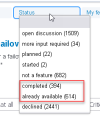Username:
TITLE
WEB UI - Fail2Ban version 0.11 supports incremental bantime, Plesk UI does not
PRODUCT, VERSION, OPERATING SYSTEM, ARCHITECTURE
Product version: Plesk Obsidian 18.0.49.2
OS version: Ubuntu 18.04 x86_64
Build date: 2023/01/10 23:00
Revision: c825df0ebc392580c3443ca51b28c6cb88be266d
PROBLEM DESCRIPTION
Plesk UI does not allow to set up incremental bantime, supported by Fail2Ban version 0.11
This incremental bantime is very valuable, in order to keep any system efficiently running.
STEPS TO REPRODUCE
1 - go to /etc/fail2ban
2 - open jail.local
3 - just add to one of the jails :
# default bantime 1h
bantime = 3600
# incremental banning:
bantime.increment = true
# default factor (causes increment - 1h -> 7d 14d 28d 56d ...):
bantime.factor = 168
# max banning time = 5 week:
bantime.maxtime = 5w
4 - reload fail2ban : service fail2ban reload
One can see in fail2ban.log that the jails are loaded without any issues.
ACTUAL RESULT
see above
EXPECTED RESULT
Plesk Team, could you be so kind as to add the UI controls that enables people to
1 - opt for standard bantime or incremental bantime
2 - fill in the desired and required values
3 - use a default factor (read: bantime.factor) of 24 (but adjustable for those that want to change the value)
4 - use a default maxtime (read: bantime.maxtime) of 4w (not adjustable, this is a good value by any standards)
ANY ADDITIONAL INFORMATION
(DID NOT ANSWER QUESTION)
YOUR EXPECTATIONS FROM PLESK SERVICE TEAM
Answer the question
TITLE
WEB UI - Fail2Ban version 0.11 supports incremental bantime, Plesk UI does not
PRODUCT, VERSION, OPERATING SYSTEM, ARCHITECTURE
Product version: Plesk Obsidian 18.0.49.2
OS version: Ubuntu 18.04 x86_64
Build date: 2023/01/10 23:00
Revision: c825df0ebc392580c3443ca51b28c6cb88be266d
PROBLEM DESCRIPTION
Plesk UI does not allow to set up incremental bantime, supported by Fail2Ban version 0.11
This incremental bantime is very valuable, in order to keep any system efficiently running.
STEPS TO REPRODUCE
1 - go to /etc/fail2ban
2 - open jail.local
3 - just add to one of the jails :
# default bantime 1h
bantime = 3600
# incremental banning:
bantime.increment = true
# default factor (causes increment - 1h -> 7d 14d 28d 56d ...):
bantime.factor = 168
# max banning time = 5 week:
bantime.maxtime = 5w
4 - reload fail2ban : service fail2ban reload
One can see in fail2ban.log that the jails are loaded without any issues.
ACTUAL RESULT
see above
EXPECTED RESULT
Plesk Team, could you be so kind as to add the UI controls that enables people to
1 - opt for standard bantime or incremental bantime
2 - fill in the desired and required values
3 - use a default factor (read: bantime.factor) of 24 (but adjustable for those that want to change the value)
4 - use a default maxtime (read: bantime.maxtime) of 4w (not adjustable, this is a good value by any standards)
ANY ADDITIONAL INFORMATION
(DID NOT ANSWER QUESTION)
YOUR EXPECTATIONS FROM PLESK SERVICE TEAM
Answer the question


